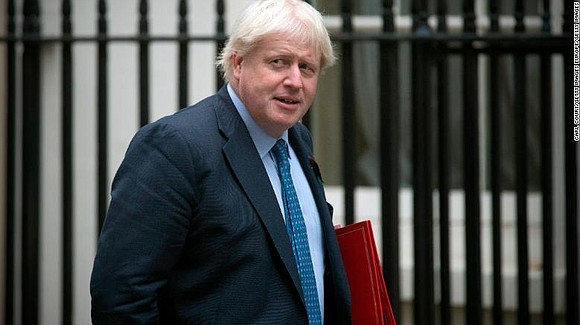Johnson: 'Overwhelmingly likely' Putin ordered nerve agent attack
CNN/Stylemagazine.com Newswire | 3/16/2018, 7:31 a.m.
By Simon Cullen and Laura Smith-Spark, CNN
(CNN) -- UK Foreign Secretary Boris Johnson said Friday it was "overwhelmingly likely" that Russian President Vladimir Putin personally gave the order to use a nerve agent to attack a former spy, in what represents the most direct accusation yet against Russia's leader.
Prime Minister Theresa May this week announced that 23 Russian diplomats would be expelled from Britain after concluding it was highly probable that Moscow was behind the poisoning, but stopped short of pointing the finger directly at Putin.
Sergei Skripal and his daughter Yulia remain in a critical condition after the March 4 attack in the English city of Salisbury. UK officials believe they were exposed to a nerve agent known as Novichok that was developed in Russia.
Russia has dismissed the UK's accusations as "unfounded" and warned it would retaliate soon over the expulsion of its diplomats.
Speaking alongside his Polish counterpart at the Battle of Britain Bunker in outer London, Johnson said the UK and its allies were waiting for a serious response from Russia about the nerve agent attack.
"The quarrel of the UK government is not with Russian people -- it is not with Russians living here in this country. We have nothing against the Russians themselves. There is to be no Russophobia as a result of what has happened," he said.
"Our quarrel is with Putin's Kremlin and with his decision -- and we think it is overwhelmingly likely that it was his decision -- to direct the use of a nerve agent on the streets of the UK, on the streets of Europe, for the first time since the Second World War."
Polish Foreign Minister Jacek Czaputowicz expressed his "full solidarity" with the UK, adding that he was prepared to work with other EU and NATO countries to protest against Russia's behavior.
"We condemn this unprecedented attack by Russia on the territory of the United Kingdom. This use of chemical weapons is a clear violation of the international law," he said.
On Thursday, British Defense Secretary Gavin Williamson said Moscow had made a "deliberate political decision" to poison Skripal. He accused Russia of "ripping up the international rulebook" and "attempting to "subvert, undermine and influence" countries around the world.
"Russia should shut up and go away," Williamson said. "It's often described as a cool war that we are entering -- I would say it is feeling exceptionally chilly at the moment."
UK-Russia relations have been fractious ever since the assassination of another former Russian spy, Alexander Litvinenko, in 2006.
A UK inquiry found that two Russian agents poisoned Litvinenko at a London hotel bar in 2006 by spiking his tea with highly radioactive polonium-210, and that Putin "probably approved" Litvinenko's killing. The Kremlin has always denied the accusation.
Skripal was sentenced to 13 years in prison in 2006 for spying for Britain, according to Russian state media accounts of the closed hearing.
Russian court officials at the time said he'd received at least $100,000 for his work for MI6, the British intelligence service. He was granted refuge in the UK after a high-profile spy exchange between the United States and Russia in 2010.




